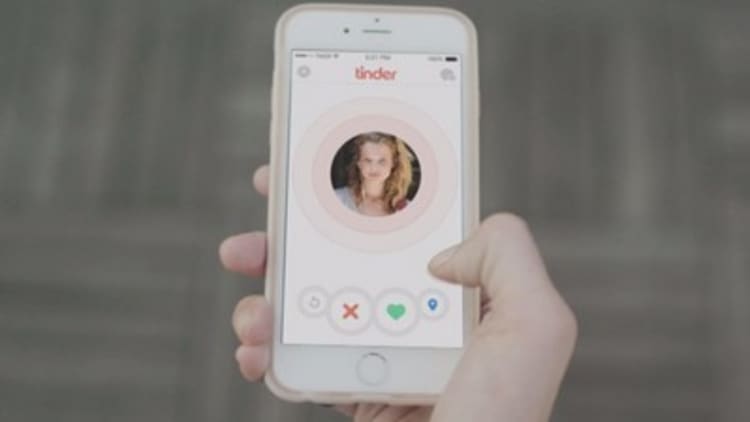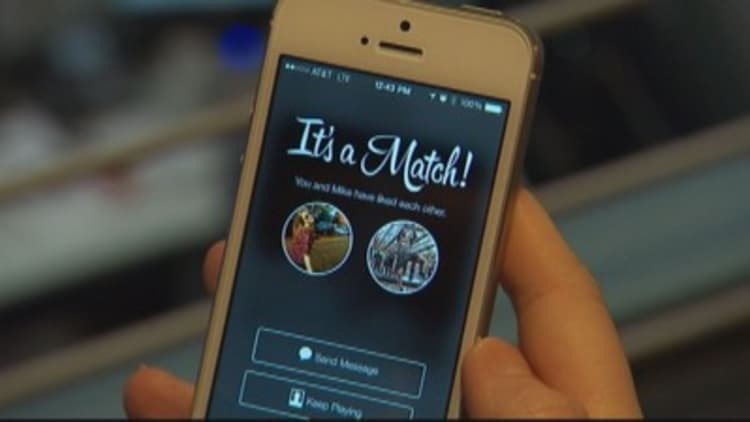
Internet dating is undeniably popular, with 41 million Americans visiting a service every month. But as a business, investors have found the prospects unattractive.
Match Group, the biggest digital romance service, is out to prove it's the one.
The 20-year-old company is spinning out of IAC/InteractiveCorp and is slated to debut Thursday on the Nasdaq under ticker symbol MTCH.
While Match has more than twice the market share of its biggest competitor and has bulked up through acquisitions, the dating market has failed to excite Internet investors, who have poured money into search, social networking and e-commerce. One reason: When a dating site makes a user happy, that person ceases to be a paying customer, at least for a while.
U.S. dating services businesses will generate a total of just $2.4 billion in revenue this year, according to IBISWorld.
Spark Networks, which owns JDate.com and ChristianMingle.com, has been the lone public market option for U.S. investors. Despite carrying the ticker symbol LOV, Spark has been pummeled, losing more than half its value since mid-2013 and seeing its market capitalization sink below $100 million. Match is seeking a valuation of close to $3 billion.
Zoosk, a former start-up darling built on the Facebook platform, withdrew its IPO filing in May, more than a year after first registering with the SEC. Match's closest rival, eHarmony, is still private 15 years after its launch and is growing at a meager 2.5 percent a year, IBISWorld data show.
In addition to its size, Match has another asset as it tries to lure investors: Tinder
The cash cow of Match is its traditional subscription business, with offerings starting at around $20 a month. But the user growth is with Tinder, the free and wildly popular mobile dating app, known for having members swipe left or right, depending on their interest.
Tinder's tagline is "friends, dates, relationships, and everything in between." In other words, it's as much for a fun night out as it is for finding a significant other.
Read MoreIn period of creative destruction: Barry Diller
"Tinder is the ultimate wild card for investors," BTIG analyst Brandon Ross wrote in a report this week. "Management acknowledges that Tinder's user and revenue growth will be somewhat difficult to predict, with greater variability in forecasts the longer you look out."
A Match representative didn't respond to a request for comment.
Match priced at $12 per share Wednesday night, and raised close to $400 million, making it one of the biggest tech IPOs, behind First Data, according to Ipreo. Payments company Square is also scheduled to sell shares Thursday night in what is likely to be the fifth biggest tech deal of the year, though it was priced at $9, below the expected price.
IAC, the Internet conglomerate chaired by billionaire Barry Diller, will still own 86 percent of Match's stock after the separation. Proceeds of the offering will be used to pay back debt.

The Tinder story in an unusual one. The business was incubated internally in 2012 and shares many characteristics with the viral messaging and social networking start-ups that have scored monster valuations from Silicon Valley venture capitalists. It has 9.6 million daily active users spending on average more than 35 minutes a day on the app. (The company's CEO, Sean Rad, also caused a bit of controversy Wednesday. Match disavowed some statements Rad made in an interview with the London Evening Standard and disputed some company data Rad cited in the interview.)
The service opened up to advertisers this year and recently introduced a paid service, starting at $10 a month, for unlimited swipes and advanced features.
JMP Securities analyst Ignatius Njoku predicts Tinder will bring in sales of $307 million in 2017, accounting for about 22 percent of Match revenue. With no contribution from Tinder last year, Match's sales increased 11 percent to $803.1 million.
Read MoreWhat is Square really worth?
Because of its high engagement levels, "we believe Tinder is poised to capitalize on these trends by ramping its advertising platform," Njoku wrote in a Nov. 9 report.
Just as Tinder offers potential growth, it also poses a risk. After all, even though the products serve different demographics — 86 percent of Tinder users are under age 35 — there's the very real possibility that Tinder and Match become more competitive over time. The same is true for Match's other properties like OkCupid and Plentyoffish.
Since early 2009, Match has spent $1.28 billion to acquire 25 brands in its dating portfolio, according to its IPO prospectus.
"The explosive growth of online daters with free profiles, particularly from Tinder, is cannibalizing the rest of the business," wrote BTIG's Ross.
Ross recommended against buying shares assuming they price in the $12 to $14 range. He isn't comfortable betting on a business that competes with itself.
Investors will now get to make that call for themselves.
"Users are willing to pay for dating apps when they need to pay to find dates," Ross wrote. "When they can find one without paying, they do not pay."




